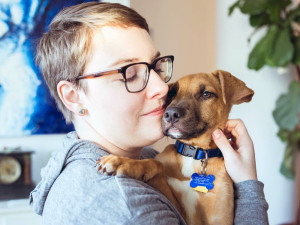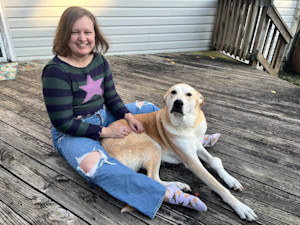What’s Stopping You From Fostering a Pet?
Here are six very good reasons why you should reconsider.
Fostering a pet can be life-changing for not just animals, but the people who take the time to offer these dogs and cats a loving, if temporary, home. So many people are hesitant to foster for a variety of valid reasons, from worries about time commitment to a fear of getting overly attached.
Kinship collected some of the most common fostering concerns from six different people. Then, we talked to Krista Almqvist, executive director at Badass Animal Rescueopens in new tab in Brooklyn, about how to overcome these obstacles and become part of the life-saving work of fostering pets with their local shelter.
“Most people know that fostering saves lives, and giving a comfortable and transitional home to a pup in need is a rewarding experience,” Almqvist says. “Oftentimes, though, there are logistical and commitment fears that keep people from joining the fostering community. While some concerns are valid, there are plenty of myths we can debunk.”
And here are some of them.
How much do you spend on your pet per year?
“I get attached far too easily and would seriously struggle when it was time to say goodbye, even if that was a good thing.” — Sara, 38
Pet parents absolutely adore their cats and dogs, so it can be daunting to imagine providing a transitional home for an animal who will eventually end up with someone else. Almqvist notes that those feelings are normal and expected, but they shouldn’t stop individuals from fostering.
“This is the most common barrier we see,” Almqvist says. “And it will happen. You’ll love every dog that comes through your door and may get emotional when they’re finally adopted. It’s important to recognize how critical of a role you play in that dog’s journey to become adoptable and get a second chance at a new beginning.”
Almqvist suggests asking yourself a few questions to determine whether you would truly be the best fit longterm for your foster pet and figure out if your attachment to your foster is forever or just temporary:
Can you keep up with their energy? Can they keep up with you?
Does your foster have ongoing medical needs, and if so, can you afford to handle those needs as their full-time parent?
Does your foster need structure and a set routine? Does your schedule and lifestyle allow that?
What type of parent does your foster need? Are you that person?
“I worry it would be too stressful for my current pets to bring another pet into my home only temporarily.” — Amie, 32
Almqvist says current pets should always be a consideration when deciding to foster. Let the rescue know how many and what kind of pets are in your home, as well as their temperaments. The organization will work with you and choose a foster that gets along well with other animals. You may even be surprised by how your own pet takes to the new addition.
“I live in a small apartment.” — Olivia, 24
If you’re interested in fostering but worried about space, talk to your local rescue or shelter about your limitations. They will be happy to work with you to pair you with a foster pet that fits with your needs and will generally provide you with most of the supplies required, so you don’t have to stress about your budget, either.
“Badass covers the expenses of preventative care and medical treatments,” Almqvist says. “Most of the expenses a foster is expected to cover are food and dog-walking related, although we do have partners and supporters who give discounts or donate supplies.”
“I don’t have time to take care of a puppy or kitten.” — Julie, 33
Time commitment is a major concern — and for good reason. A pet is a huge responsibility, and it’s important to acknowledge that commitment. But Almqvist emphasizes that fostering and pet parenthood are two very different things.
“Being part of a foster network doesn’t mean you are being depended on 365 days a year,” she says. “You can take a break when you need it. Of course, when you bring a pet into your home for the first time, it’s important that you have the time to help acclimate them to their new environment, but you can then return to your normal schedule.”
“My job keeps me busy, and my partner and I both work outside the home.” — Courtney, 31
Every person’s life has different responsibilities and commitments, from career demands to family obligations. But you may be surprised how easily a foster pet could fit into your life.
“It’s true not everyone has time for a dog, and it’s incredibly important to recognize that having one is a commitment,” Almqvist says. “However, if you have time to donate, fostering is a great option. If you travel or occasionally need to be somewhere for work or other reasons, there are temporary fosters who can take your pup while you’re gone.”
“I had a bad fostering experience in the past.” — Kaitlin, 25
Not every pet is right for you. Sometimes, a fostering experience may not work out, and that’s OK. That’s why there is a network of other foster parents who can help you out and might be a better fit for that dog or cat. Don’t let one difficult experience stop you from providing an animal in need with a loving place to stay.
“Most, if not all, foster dogs are coming from stressful environments and shelters,” Almqvist says. “Whatever you can provide is likely going to be an improvement. However, you should also not expect to be placed with a dog that needs more than you can give.”
The Badass Foster Program (apply hereopens in new tab!), and many programs around the country, allow you to specify your size and energy limitations and will then match you with a foster pet that fits your lifestyle.
“Being a foster is not for everyone, but ultimately, it’s not as difficult as it might seem,” Almqvist says. “There’s a whole network of support and flexibility to work within schedules, lifestyles, and experiences.”












